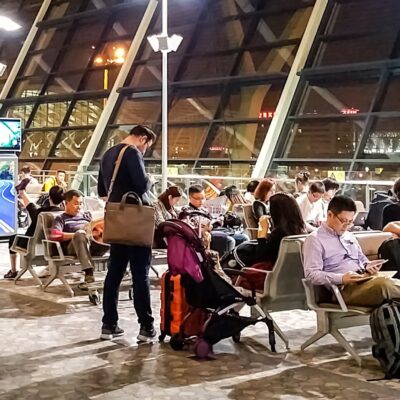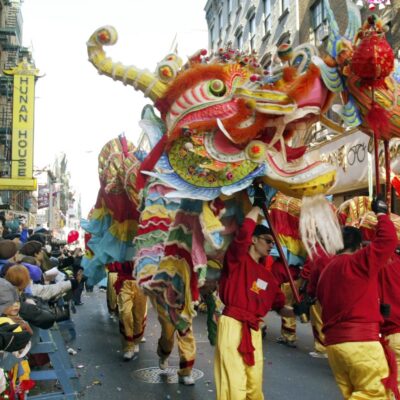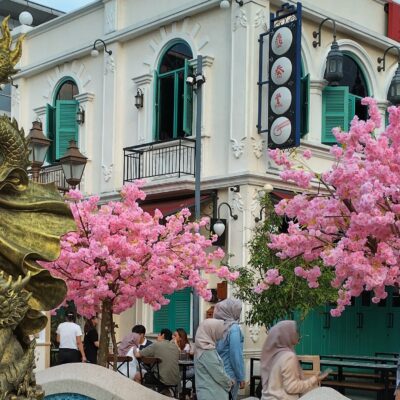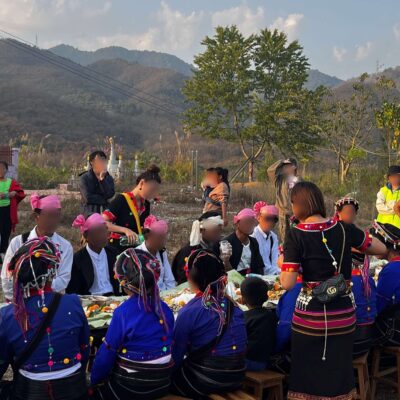Since the 2000s, the People’s Republic of China (PRC) has emerged as Africa’s largest trading partner and investor, surpassing the United States and the European Union. This shift has been accompanied by flagship geopolitical initiatives such as the Belt and Road Initiative—with 53 out of 54 African countries signing Memorandums of Understanding (MoUs) with China—and the Forum on China-Africa Cooperation (FOCAC). While geopolitical analyses have raised important concerns relating to debt diplomacy, extractive industries, labour rights, and racial tensions, less attention has been given to the Chinese migrant communities in Africa, the internal differentiation among them and their impact on local communities.
This article seeks to move beyond these limitations by examining Chinese transnationalism in Botswana, a landlocked, semi-arid Southern African nation with a population of 2.6 million. Transnationalism refers to the processes by which migrants maintain and forge multi-stranded social, economic, political, and cultural ties across national borders. Anthropologist Aihwa Ong argues that transnationalism facilitates “flexible citizenship,” whereby elite migrants strategically acquire multiple nationalities to maximize economic opportunities, reinforcing class inequalities by privileging the wealthy who can navigate global systems while marginalising populations with less mobility. While Ong insightfully highlights the differentiating power of transnationalism between the mobile and immobile, her framework pays less attention to host-country conditions that may also stratify immigrant communities.
As one of Africa’s most prosperous countries yet marked by stark economic inequality, Botswana offers an excellent lens through which to examine variations in Chinese transnationalism. The 1990s witnessed substantial growth in aid projects by Chinese State-owned enterprises (SOEs), with some employees venturing off to start their own businesses. Meanwhile, Chinese shopkeepers formed a third wave of immigration. Together they add up to an estimated 15,000 Chinese working and residing in Botswana.
My research
My research on this topic in 2022 involved semi-structured interviews with 54 interviewees*. Among the 34 Chinese participants I interviewed were business elites, company managers, and temporary workers from both Chinese SOEs and private enterprises, along with shopkeepers. The 19 Batswana informants included immigration consultants, employees of Chinese companies, shop clerks with Chinese business connections, as well as two university lecturers, and a journalist. In addition, a Tanzania expatriate was interviewed. In cases of heightened employment tensions—particularly between Chinese shopkeepers and Batswana shop clerks—I engaged a Batswana research assistant to conduct interviews with the clerks. I also paid short visits to project sites, Chinese shops, and local communities to collect data.
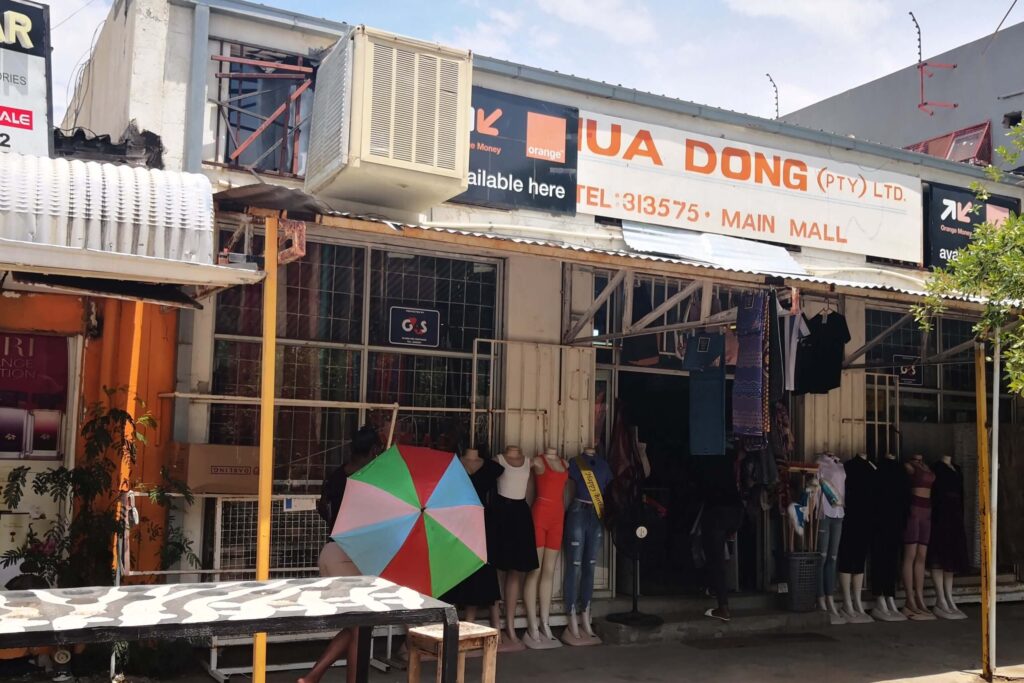
A Chinese shop at Main Mall, Gaborone. Credit: Author.
Chinese employees of state-owned enterprises (SOEs) and institutions
One prominent pathway for Chinese migration to Botswana has been through aid projects and related contract work. China began sending medical aid teams to Botswana in 1981which has continued since. In 1988, the China National Complete Plant Import & Export Group Corporation (COMPLANT) set up an office in Botswana, tasked with implementing development projects. This was followed by the arrival of the China Civil Engineering Construction Corporation in the 1990s to upgrade railways using Chinese machinery. At around the same time, the Institute of Geographic Sciences and Natural Resources Research was invited by the Botswana government to map the nation’s lands, in part to reduce Botswana’s “heavy reliance on European and South African surveyors.” Lacking skilled labour in its nascent industries, Botswana also had PRC contract labour working in textile companies, butcheries and filler stations, and later subcontractors worked on mega construction projects, including the Kazungula Bridge, which was completed in 2020. Another provincial SOE, Jiangsu International Economic and Technical Cooperation, has been involved in constructing numerous government buildings, including the High Court in Gaborone.
Over the years, these projects have attracted many Chinese professionals, managers, engineers, and workers to Botswana.
Chinese employees of SOEs who transitioning into private business
As Chinese SOEs underwent localization, some employees ventured out to start their own businesses. For example, one of the largest construction companies in Botswana, EXTRA (a pseudonym), was founded in the late 1990s by a manager from a municipal branch of the China State Construction Engineering Corporation. I interviewed a former employee of Jiangsu International Economic and Technical Cooperation (JIETC) who transitioned into being a private constructor in Botswana who stated that there were advantages to operating businesses in Botswana as compared with China, such as being free from triangular debt (sanjiao zhai), typical in China, which involves many banquets, gift exchanges, and other personal relationship building essential for the cultivation of business guanxi and receiving payment. Furthermore, freehold property rights available in Botswana help stabilise long-term investments and the localised businesses are able to maintain Chinese connections with their former employers, which help them secure further subcontracting opportunities.
In addition, auxiliary personnel from the SOEs—often relatives of managers and employees—established local businesses as traders or manufacturers. For example, I interviewed Mr Wu (not his real name) who sold wholesale construction materials and furniture imported from China while also manufacturing his own mattresses. As the brother-in-law of a manager stationed in Botswana in the 2000s, he initially provided decoration services for the company’s dormitories. Since then, he has expanded his business to include a large warehouse and employs two young relatives from China.
Chinese shopkeepers from traditional migrating provinces
In contrast to the project-led migration, the second wave—composed predominantly of shopkeepers—is more grassroots in nature, geographically diverse in origin, and self-paced. Primarily originating from Fujian and Guangdong provinces, these migrants established shops in both urban centres and remote villages. In the capital city Gaborone, their shops are concentrated in several key areas: Main Mall, a commercial district developed by early Indian shop owners after Botswana’s independence in 1966; Mogoditshane, the city’s most densely populated district; and most notably, Oriental Plaza, where several two-story buildings are occupied exclusively by hundreds of Chinese shopkeepers licensed to wholesale goods imported from China.
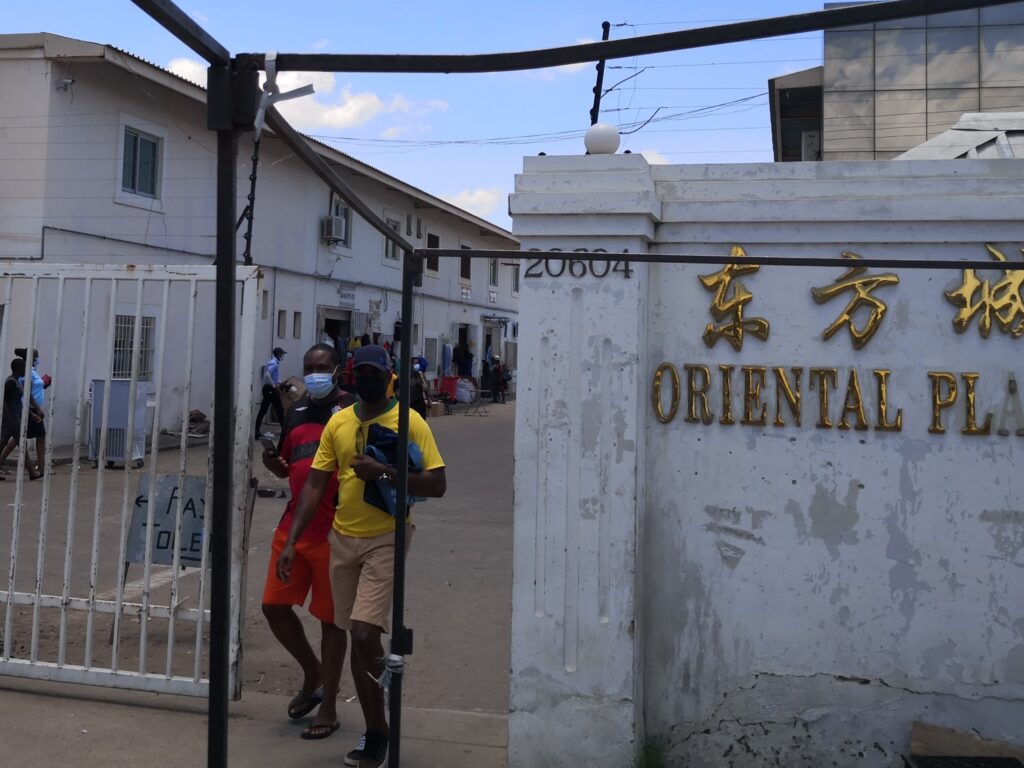
Oriental Plaza. Credit: Author.
The goods sold in Chinese shops—ranging from clothing, shoes, carpets, dishware, electronics and wigs—cater to low-income locals. As two Batswana professors from the University of Botswana explained, affordable shoes and shirts from these shops allow children to attend school without the burden of expensive uniforms. In local tradition, school uniforms are typically sponsored by the children’s maternal uncles, reflecting the custom of uncles bringing gifts to their married sisters’ families. This practice has earned Chinese shopkeepers the endearing nickname “machina malope” (meaning “Chinese uncles”). But there are more negative layers of interaction with locals.
Localised labour policy and racial divides
While Botswana’s liberal legal framework, weak industrial base, and growing consumer demand have facilitated the inflow of Chinese expatriates and bolstered their economic success, some policies of Botswana’s government have also significantly shaped day-to-day Chinese-Batswana interactions—potentially reinforcing racial divides.
Established under the Revised National Policy on Incomes, Employment, and Profits (2005), these policies aim to protect the local labour market by encouraging businesses operating in Botswana—particularly foreign-owned companies—to prioritize hiring citizens over non-citizens with similar qualifications and experience. In practice, this means that Chinese employers cannot bring in professionals or laborers from China unless they can demonstrate that suitable local talent is unavailable. These localisation policies, while well-intentioned, have led Chinese companies to adopt specific staffing strategies that further complicate labour dynamics.
In both SOEs and private Chinese companies, positions in public relations and human resource management are typically reserved for locals. This strategy aims to maximize the Setswana language proficiency and local connections of these employees, enabling them to mediate conflict with the public, media, or local laborers effectively. Chinese companies also strategically hire locals with strong connections with authorities (such as police officers) to ensure prompt intervention in cases of break-ins or robberies that cause substantial property loss. Meanwhile, skilled laborers are enrolled through labour agencies (laowu gongsi) to avoid paying them during project downtime. These skilled workers are often designated as foremen, tasked with supervising local laborers.
This worksite hierarchy between Chinese skilled workers and local laborers frequently generates racial tensions. For example, for a sewage project awarded to EXTRA Company (not its real name), three Chinese resident engineers led a team of 20 skilled Chinese workers, who supervised approximately 500 Batswana labourers, mostly from nearby villages. Chinese skilled workers frequently criticized the local labourers’ inefficiency, claiming they were less dedicated than workers in other African countries such as Zambia and Zimbabwe. They attribute this to Botswana’s labour laws, which they viewed as overly protective. Conversely, local skilled labourers argue that their monthly salaries of 3,000 to 4,000 pula (USD 220–293) are inadequate for basic needs. Moreover, the practical experience they gain from Chinese companies lacks formal certification, preventing recognition by parastatal companies that offer monthly salaries above 9,000 pula (USD 660). Most significantly, Batswana workers believe their career growth is stifled because the government consistently awards contracts to Chinese firms, which hire them only as manual laborers rather than higher skilled subcontractors. In short, Chinese companies provide only stopgap employment opportunities—far from satisfactory and with no long-term prospects.
Tensions between Chinese shopkeepers and local employees reveal a similar—and often more acute—dilemma. Chinese shopkeepers overwhelmingly prefer workers from Zimbabwe or Zambia over local Batswana workers, whom they view as uncommitted and inefficient. However, hiring non-Batswana workers requires either a diploma for managerial positions, or granting foreigners equity in the business. These legal requirements make hiring African migrants impractical for most Chinese shopkeepers.
Interviews with ten Batswana employees—mostly women aged 20 to 30—working in Main Mall and Oriental Plaza in Gaborone reveal working conditions that sharply contrast with Chinese employers’ perspectives. Their monthly salaries range from 1,250 to 1,700 pula (USD 92–125), which are slightly higher than those of clerks at local budget supermarkets such as PEP stores (800 pula/USD 59) or at Indian-owned shops. But Chinese shop owners enforce strict expectations: punctuality and perfect attendance, constant customer service, and shelf-stocking during downtime. Failure to comply may result in verbal abuse or illegal salary deductions. Additionally, Batswana employees are told by their Chinese employers to monitor and report theft and sometimes have the value of stolen goods docked from their pay. This creates a dangerous dilemma: shop assistants face threats from local thieves if they report incidents, as evidenced by one employee who was assaulted after reporting a theft.
The prevalence of theft, subsistence wages, and dead-end positions for Batswana employees exposes a mutual precarity—both Chinese shops and their workers are trapped in marginalized sectors of the urban economy. I found shopkeepers living in walled compounds, their self-segregation a defensive response to break-ins or robberies targeting Chinese businesses. This physical divide mirrors the transactional nature of Chinese-Batswana employment relations: jobs offer neither living wages nor dignity yet persist as last-resort options in Botswana’s constrained labour market. Over half of interviewees remain in these roles, enduring verbal abuse and punitive salary deductions—a testament to the absence of viable alternatives.
By contrast, Chinese managers in SOEs and private companies are largely insulated from labour tensions because Chinese skilled workers mediate between management and local workers. Ironically, these same skilled workers are often viewed by Chinese managers as lacking suzhi—a term denoting personal quality/civility that also implies inadequate language skills for communicating with local laborers. This suzhi discourse serves dual purposes: it preserves Chinese managers’ self-image as educated, professionally mobile individuals in Africa, while simultaneously determining which segments of Chinese and Batswana populations interact directly.
Conclusion
How does Chinese transnationalism unfold across different migrant groups, and how does their interaction with Botswana’s society shape local workers’ lives? This essay reveals two key patterns. First, Botswana’s Chinese diaspora is sharply stratified, divided between SOE elites, entrepreneurs, and shopkeepers—each with distinct migratory paths and inhabiting economic niches. Second, their uneven integration into Batswana society—from dealings with officials to fraught labour relations—reinforces existing hierarchies withing Botswana.
SOE-affiliated migrants often transition into private business, leveraging state connections and Botswana’s favourable investment climate. In contrast, self-reliant shopkeepers—predominantly from Fujian and Guangdong—dominate low-cost retail sectors but frequently clash with local employees over exploitative wages and harsh working conditions. Botswana’s localization policies, designed to protect citizens, ironically deepen racial divides: Chinese employers favour foreign laborers, while Batswana workers resent being relegated to unstable, low-skilled jobs.
This hierarchy mirrors broader post-colonial economic dependencies, where foreign capital flourishes while local labour remains marginalized—despite stopgap legal protections. The result is a self-perpetuating cycle of socio-economic disparity, reinforcing the very inequalities Botswana’s policies aim to mitigate.
*All interviewees are referred to by pseudonyms to protect their identities.
The author acknowledges the sponsorship of IFAS (Institut Français d’Afrique du Sud) for sponsorship of fieldwork.
Further reading:
- Chinese investor perspectives on customary land disputes in Vanuatu.
- China’s diaspora engagement policy and its powerful effect outside its borders.
- 中国的侨民沟通政策及其在中国境外的强大影响.
Main image: A Chinese foreman and a Batswana worker. Credit: Author.

